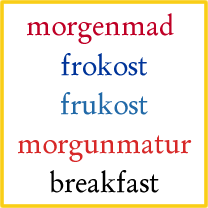
Yesterday I learnt that the Danish word for breakfast is morgenmad [ˈmɒːɒnˌmað] (“morning food”), which makes sense [source].
Lunch is frokost (“early meal”), which made me think of the German word for breakfast Frühstück (“early piece”).
Frokost comes from the Middle Low German vrōkost (early meal), from vrō (early) and kost (meal, food) [source].
In Norwegian frokost is breakfast, and lunch is lunsj.
In Swedish breakfast is frukost and lunch is lunch.
In Danish dinner is aftensmad (“evening meal”), or middag (“midday”), which also means noon, banquet or lunch. In Norwegian and Swedish middag means dinner, noon or midday [source]. Somewhat confusing!
In Icelandic the meals are: morgunmatur (breakfast – “morning food”) hádegismatur (lunch – “noon food”) and kvöldmatur (dinner – “evening food”) [source].
In Faroese morgunmatur means breakfast, lunch or a snack [source]. Lunch is also miðmáli [source]. Dinner is døgurði [ˈtøːvʊɹɪ], which can also mean lunch [source], or nátturði [ˈnɔtːˌʊɹɪ] = dinner, supper (main) meal in the evening [source].
What do you call the different meals?
The first meal of the day is breakfast for me, whenever I have it. The meal in the middle of the day I used to call dinner, but now call lunch. The evening meal I call tea, or dinner if I eat out somewhere.
In some regions of Mexico un lonch is a sandwich. Lunch is almuerzo or comida. Indonesian: breakfast is often “sarapan,” which I think has the sense of “leftovers.” Lunch is makan siang, midday meal, and the final meal is makan malam, evening meal.
Correction: my Indonesian friend informs me that sarap and sarapan are unrelated, although “sarap” is listed as the root in dictionaries. Makan pagi, morning meal, is also used.